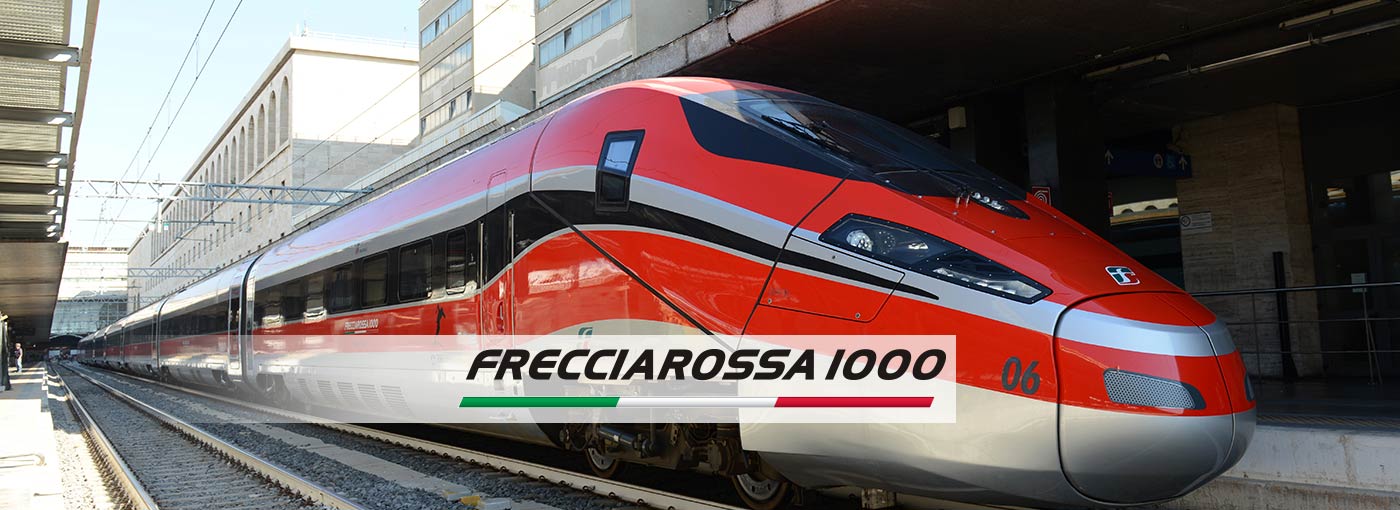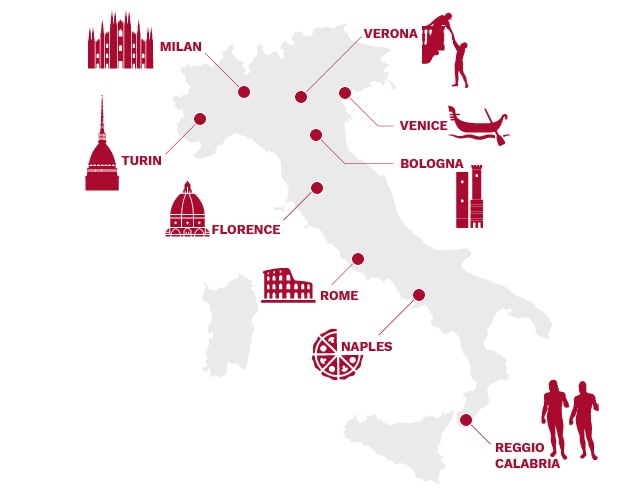
Find the answers to your questions about the train in Italy
Travelling by train in Italy
The good news is that the train in Italy generally runs on time and is quite affordable, especially if you book well in advance.
Italy has high-speed, luxury trains and regional trains. The latter ones connect smaller places. The type of train to choose depends on budget, destination and available time.
Your content goes here. Edit or remove this text inline or in the module Content settings. You can also style every aspect of this content in the module Design settings and even apply custom CSS to this text in the module Advanced settings.
Types of trains in Italy
It is imperative to understand that several companies operate the railways in Italy. This means one can sometimes choose between several operators for the same route. Therefore, the information provided at the relevant websites, ticket counters or vending machines depends on the operator and is not always complete.
High-speed trains in Italy
Trenitalia, the Italian state rail network, operates most high-speed trains.
A private company, Italo, operates other lines. The Italian high-speed trains are relatively cheap if you buy the tickets well in advance. However, you always have to make a reservation for high-speed trains.
Tickets for the two options are competitively priced and quite comparable, although the trains sometimes stop at different stations. Tickets for high-speed trains usually cost more than regular trains but are much faster.
Le Frecce (the arrows) are Trenitalia’s high-speed trains.
- Frecciarossa (red arrow) is the fastest, with speeds of up to 300 km per hour.
- Frecciargento (silver arrow) goes up to 250 km/h and
- Frecciabianca (white arrow) with rates up to 200 km/h.
Intercity
- The EuroCity (EC) is a European international long-distance intercity train. All EuroCity trains have their name referring to a place, person or another proper name.
- InterCity (IC) is the regular intercity train.
- InterCity Notte (ICN) – the intercity night trains have sleeping cars.
Regional train
Regional trains in Italy are slower than intercity trains but serve a much more comprehensive network of cities and towns across Italy. Many trains do not require reservations, and some only have second-class carriages. Regional trains may be your only option when travelling through rural parts of Italy. They take longer but are often the cheapest option.
- Regionale (REG) – The regional train (indicated by the abbreviation R or REG on the timetable, running within the same region or between neighbouring areas.
- Regional veloce (RV) – is a fast regional train (referred to on the timetable as RV or RGV. They run between two or three regions. On routes where there are both regional services and fast regional services, the RV is faster due to fewer stops made.

Is it better to buy a rail pass or individual tickets in Italy?
What is a rail pass?
Rail passes are a great option if you like flexibility, if you plan to travel extensively through one or more countries or if you plan to cover long distances on your travels. Rail passes give you access to most rail routes and offer hassle-free journeys as you don’t have to queue at the station to get tickets. However, you will still have to make a reservation or pay for supplements. Still, you can use the pass indefinitely on many routes at no extra cost.
What is a city-to-city ticket?
City-to-city tickets are suitable for short distances, such as travelling from one city to another within a country (for instance, between Verona and Venice) or visiting only one or two places. On the other hand, buying individual train tickets might be the best pick for those wanting to travel on a limited basis. There are different options for individual train tickets, depending on the kind of train you choose and your destination.
What type of pass should I buy?
Purchasing a ticket or rail pass can sometimes be confusing, with thousands of different passes and ticket combinations. Consider the following points in your purchase decision:
- Which and how many countries in Europe are you planning to visit?
- How many travel days do you need? A travel date is a calendar day. Regardless of the number of trains you take on a calendar day, you need to know how many days you will travel by train to buy the correct number of travel days.
- How many days do you need the pass? All passes have different validity periods. The days you need the pass corresponds to the duration of your trip, not the number of days you are on the train. So if you’re going to Italy for a month but only use the train for a couple of days at the start and some days at the end of your journey, you’ll still need a pass valid for 30 days
Do I have to make a reservation with a rail pass?
A pass does not guarantee a seat on a train. So reservation is highly recommended and often obligatory.
Book in time because the number of seats is limited. Additional charges may apply for seat reservations, sleeping cars, couchettes and travel on certain high-speed trains. To avoid being fined on board, I strongly recommend booking in advance.
When and how do I make a reservation?
Reservations can be made online or at a train station up to 60 days before the journey. To book a reservation, you will need a valid rail pass or ticket that covers the train’s route. To reserve a seat online, go to the ‘search’ box, choose the destination and select “seat reservation only” to make a reservation.
Reservation is required for
- Sleeping accommodations on all-night trains
- High-speed trains (e.g. Eurostar, TGV, TAV, Thalys)
- Long-distance trains and express trains in high season (July-August).
How and why do I need to validate my train pass?
All rail passes must be validated twice. The conductor can confiscate the pass if you boarded the train before validating the ticket.
- The first stamp is automatically printed by the drop-off point upon purchase and is located at the top right of the card. The card must be used within 6 months after this validation.
- On the first day of travel, all persons named on the pass must have the pass validated at the station counter. The station officer must put a second stamp on the pass below the first.
If you do not start using the pass within six months of the printing date, you can return the pass and will receive a new one.
How do I validate my train ticket?
Reservations emailed to you must be printed out before travel and validated before boarding the train. In addition, all printed tickets (coupons) must be validated for European use. For example, suppose you are travelling with an E-ticket, and your reservation is marked “Print at Train Station”. In that case, you must print this coupon and validate the ticket.
- Find the platform of your train for this. Each platform has a self-service machine and yellow validation machines.
- Go to the self-service ticket machine and enter the PNR confirmation number to print the ticket.
- Then go to the validation machine. Insert the ticket into the slot provided. The ticket is thus validated with a date stamp.
If you forget, you can be fined up to 200 euros.
E-ticket
Suppose you have an E-ticket or Electronic ticket with a “ticketless” confirmation. In that case, you can simply board the train without printing or validating.
More suggestions?
Do you have anything to add or different ideas? Contact me via social media or drop me a mail.
You might also be interested in:
The ferry from Harwich to Hoek van Holland in the Netherlands: tips
Travelling from the Netherlands by ferry from Hoek van Holland to Harwich will take approximately seven hours during the day. At night the journey takes about eight to nine and a half hours. Travel as a foot passenger, by car, or take your bicycle.
Plan the ultimate road trip with this quick checklist
The ultimate checklist for a road trip through Europe by car. Tips on insurance, documents, car maintenance, luggage, your health and the internet.
The ferry from Dover to Calais or Dunkirk: 7 tips
The best tips for taking the Ferry from Dover to Calais or Dunkirk. How to safe money and time and the beste place to visit en route.
Step by step guide how to get to Madrid Airport by train
Step by step guide how to get to Madrid Barajas airport in time by train via Atocha, using the AVE and short distance train C1.




